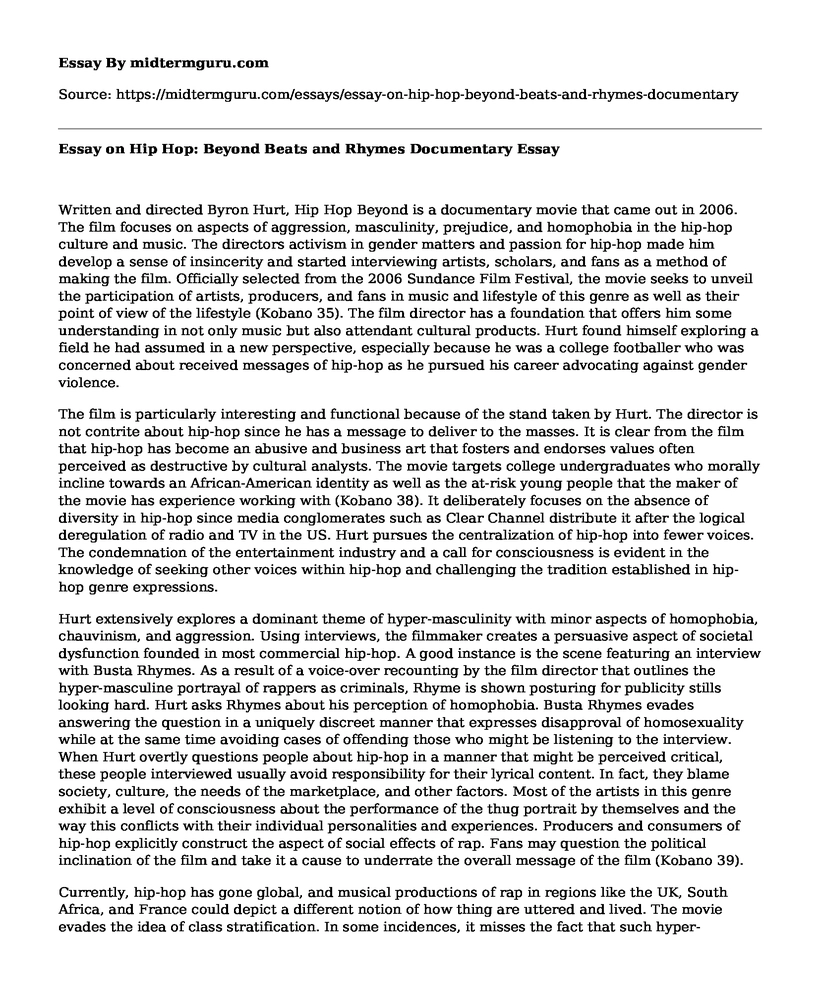Written and directed Byron Hurt, Hip Hop Beyond is a documentary movie that came out in 2006. The film focuses on aspects of aggression, masculinity, prejudice, and homophobia in the hip-hop culture and music. The directors activism in gender matters and passion for hip-hop made him develop a sense of insincerity and started interviewing artists, scholars, and fans as a method of making the film. Officially selected from the 2006 Sundance Film Festival, the movie seeks to unveil the participation of artists, producers, and fans in music and lifestyle of this genre as well as their point of view of the lifestyle (Kobano 35). The film director has a foundation that offers him some understanding in not only music but also attendant cultural products. Hurt found himself exploring a field he had assumed in a new perspective, especially because he was a college footballer who was concerned about received messages of hip-hop as he pursued his career advocating against gender violence.
The film is particularly interesting and functional because of the stand taken by Hurt. The director is not contrite about hip-hop since he has a message to deliver to the masses. It is clear from the film that hip-hop has become an abusive and business art that fosters and endorses values often perceived as destructive by cultural analysts. The movie targets college undergraduates who morally incline towards an African-American identity as well as the at-risk young people that the maker of the movie has experience working with (Kobano 38). It deliberately focuses on the absence of diversity in hip-hop since media conglomerates such as Clear Channel distribute it after the logical deregulation of radio and TV in the US. Hurt pursues the centralization of hip-hop into fewer voices. The condemnation of the entertainment industry and a call for consciousness is evident in the knowledge of seeking other voices within hip-hop and challenging the tradition established in hip-hop genre expressions.
Hurt extensively explores a dominant theme of hyper-masculinity with minor aspects of homophobia, chauvinism, and aggression. Using interviews, the filmmaker creates a persuasive aspect of societal dysfunction founded in most commercial hip-hop. A good instance is the scene featuring an interview with Busta Rhymes. As a result of a voice-over recounting by the film director that outlines the hyper-masculine portrayal of rappers as criminals, Rhyme is shown posturing for publicity stills looking hard. Hurt asks Rhymes about his perception of homophobia. Busta Rhymes evades answering the question in a uniquely discreet manner that expresses disapproval of homosexuality while at the same time avoiding cases of offending those who might be listening to the interview. When Hurt overtly questions people about hip-hop in a manner that might be perceived critical, these people interviewed usually avoid responsibility for their lyrical content. In fact, they blame society, culture, the needs of the marketplace, and other factors. Most of the artists in this genre exhibit a level of consciousness about the performance of the thug portrait by themselves and the way this conflicts with their individual personalities and experiences. Producers and consumers of hip-hop explicitly construct the aspect of social effects of rap. Fans may question the political inclination of the film and take it a cause to underrate the overall message of the film (Kobano 39).
Currently, hip-hop has gone global, and musical productions of rap in regions like the UK, South Africa, and France could depict a different notion of how thing are uttered and lived. The movie evades the idea of class stratification. In some incidences, it misses the fact that such hyper-masculinity is also established, although portrayed differently, in America heavy metal and country western music. Therefore, when one culture is left to dominate in hip-hop, the diversity that is seen through globalization is lost. Because of the dominance of African Americans in the field of hip-hop, white fans are perceived as ignorant, playing at cultural imitation while having the privileges provided by their background. The director of the film passes an important message that Hispanics are underrepresented in addition to other minority groups (Kobano 43). There is no reference of Eminem, a man whose picture surpasses hyper-masculinity to become a self-conscious spoof of his individual ridicule. This is an odd exclusion considering that Eminem is among the highest selling artists of the 20th century. He is also lyrically aggressive. There is an inadequate exploration of the complexity of race and hip-hop consumption and performance.
By concentrating on the music as the inspirational force of character, many questions emerge with regard to underlying cultural values and incentives that foster the aspect of hyper-masculinity embedded in rap. A close analysis of cultural situations that emphasize the United States of Americas hyper-masculinity would raise concern on how much the behavioral illustration is perceived beyond hip-hop culture to the US dominant norms, especially males in the workforce under the age of 30 years. Although the film touches on this fact, it fails to develop the idea explicitly. Understandably, this is not what the film intends to explore or sufficiently cover within 60 minutes.
Work Cited
Kobano, Baruti N. Soul Thieves: The Appropriation and Misrepresentation of African American Popular Culture. Palgrave/JD/May. 2014. Print.
Cite this page
Essay on Hip Hop: Beyond Beats and Rhymes Documentary. (2021, May 25). Retrieved from https://midtermguru.com/essays/essay-on-hip-hop-beyond-beats-and-rhymes-documentary
If you are the original author of this essay and no longer wish to have it published on the midtermguru.com website, please click below to request its removal:
- Examination of the Picture: Ginevras Portrait - Art Essay Sample
- Analysis of Americas Conversation on Race Political Cartoon - Essay Sample
- Paper Example on Upgrading the Decor of Persuade Cafe
- Food Practices: Beyond Hunger: A Social & Psychological Perspective - Research Paper
- Movie Analysis Essay on Born This Way
- Movie Analysis Essay on The Movie of Capitalism
- Movie Analysis Essay on Hamlet by David Tennant







